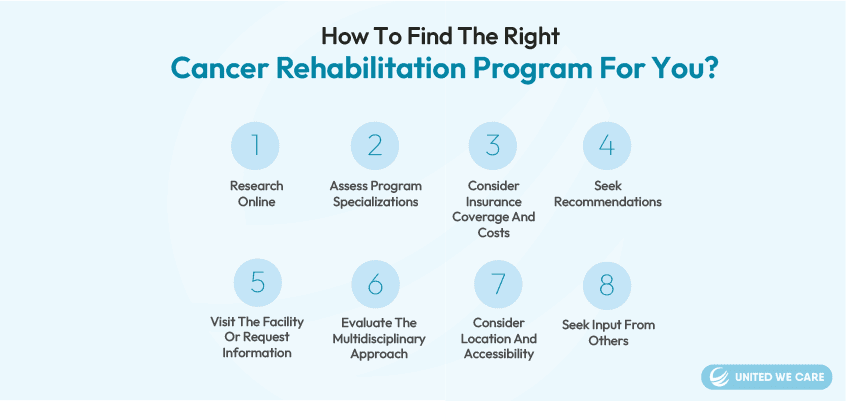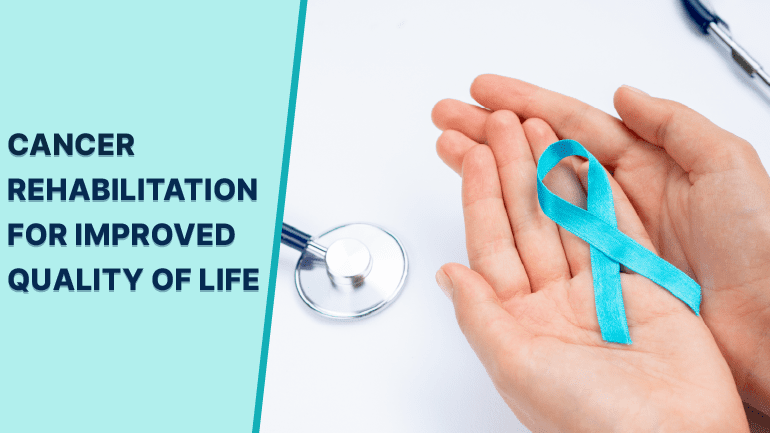Introduction
Rehabilitation is a type of care provided to individuals who have experienced a loss in their mental or cognitive abilities due to injury, illness, or the side effects of medication. Cancer rehabilitation programs offer support to those who have faced cognitive challenges during their cancer treatment. These programs aim to help individuals regain functionality through interventions such as therapy, occupational therapy, music therapy, support groups, and more.
Finding The Cancer Rehabilitation Program
Finding the cancer rehabilitation program that suits your specific needs involves consideration and research. Here are some steps to help you in your search;
- Consult with Your Healthcare Team: Have a conversation with your oncologist or healthcare team regarding the importance of cancer rehabilitation. Ask for their recommendations or referrals to programs.
- Conduct Online Research: While exploring rehabilitation programs, make sure to check if the facility or program is accredited and specializes in providing cancer rehabilitation services. Additionally, consider factors such as location, staff expertise, and available services. Read reviews and testimonials from previous participants.
- Evaluate Program Specializations: Take a look at the services offered by each cancer rehabilitation program and determine if they align with your unique requirements.
- Consider Insurance Coverage and Costs: Before finalizing any decision, review the payment options for program fees. Confirm whether the rehabilitation facility accepts your insurance plan.
By following these steps, you can navigate through the process of finding a cancer rehabilitation program that caters to your needs. Make sure to examine the expenses associated with the program and whether the cost of the rehabilitation program aligns with your budget [4].
Get Recommendations: Reach out to cancer support groups or fellow cancer survivors for suggestions on reputable programs.
Visit the Facility. If possible, arrange a visit to the rehabilitation center. Meet the staff—request materials about their rehabilitation program.
Assess the Multidisciplinary Approach: Evaluate whether the program adopts an approach that involves a team of healthcare professionals specialized in oncology rehabilitation.
Consider Location and Accessibility: Take into account factors such as proximity to your home, transportation options, and any specific accessibility needs when considering the location of the rehabilitation program.
Consult Others: When evaluating any rehabilitation program, discuss it with your family members, friends, and healthcare professionals involved in your treatment and care.
What Exactly Is Cancer Rehabilitation?
Cancer rehabilitation involves care for individuals going through cancer treatment. Rehabilitation professionals guide them in maintaining and restoring their emotional well-being. This approach combines therapies like therapy, occupational therapy, speech therapy, pain management techniques, psychological support services, and nutritional counseling.
The primary objective of cancer rehabilitation is to improve the quality of life for cancer survivors by assisting them in rebuilding strength and managing symptoms associated with treatment. It also focuses on reducing pain levels, enhancing mobility and function, and addressing psychological needs. The ultimate goal is to aid individuals in their recovery journey by promoting independence and overall well-being [1].
What Are The Various Types of Cancer Rehabilitation?
Cancer rehabilitation programs cater to the psychological impacts that cancer treatment can have on individuals. By addressing these aspects, these programs help restore functionality and well-being. Here are some common approaches commonly used in cancer rehabilitation programs[2]:
- Physical Therapy: The focus of therapy in cancer rehabilitation is to assist individuals with mobility and pain-related challenges as well as enhance their overall strength and physical functioning.
- Occupational Therapy: In cancer rehabilitation programs, occupational therapy aims to support individuals in performing their activities, including self-care routines and work-related tasks.
- Speech and Swallowing Therapy: People who have surgeries or other cancer treatments may experience difficulties with speech and swallowing. Speech therapy and swallowing therapy are part of the rehabilitation program to address these issues.
- Pain Management: Cancer treatment can be a process. Pain management therapy is a component of cancer rehabilitation programs, helping individuals effectively manage their pain.
- Psychological and Emotional Support: Dealing with cancer involves not only pain but also psychological challenges such as low self-esteem and emotional distress. Rehabilitation programs for individuals with cancer include counseling, psychotherapy, and support groups to address these aspects.
- Lymphedema Management: Lymphedema refers to swelling in body parts that can occur as a result of cancer treatment. Rehabilitation programs for cancer also incorporate therapies and techniques to manage this condition effectively.
- Nutritional guidance: Nutritional or dietary counseling plays a role in aiding individuals going through cancer treatment by providing them with information about healthy food choices and the appropriate calorie intake to prevent nutritional deficiencies.
What Are The Advantages Of Cancer Rehabilitation?
Cancer rehabilitation offers a range of benefits to those who have undergone cancer treatment. These benefits encompass:

- Function: Rehabilitation programs assist cancer patients in improving their physical abilities. Cancer can often lead to a decrease in strength, mobility, and overall functionality, making it challenging for individuals to care for themselves independently. Rehabilitation professionals develop tailored programs that address these challenges, enabling patients to work towards regaining functioning.
- Pain management: Cancer treatments can be accompanied by pain, and individuals undergoing treatment struggle with managing it effectively. Rehabilitation programs focus on employing strategies for pain management that help patients navigate through their pain and facilitate recovery.
- Quality of life: By addressing the obstacles faced during cancer treatment and providing effective pain management techniques, rehabilitation programs contribute to enhancing an individual’s overall quality of life. The program’s main focus is on improving the well-being and overall quality of life for individuals after they have undergone cancer treatment.
- Boosted Energy and Endurance: Cancer treatment can be a lengthy process involving checkups, chemotherapy sessions, and surgeries. These procedures take a toll on individuals both physically and emotionally. The rehabilitation programs aim to uplift individuals by designing interventions that increase their energy levels and endurance. This enables them to participate actively in activities they enjoy.
- Emotional and Mental Support: The Rehabilitation program not only works towards enhancing abilities but also provides crucial emotional and mental support to individuals as they undergo cancer treatment.
- Improved Body Image and Self-confidence: People dealing with cancer treatment often experience changes and psychological distress. The cancer rehabilitation program is there to support them throughout this journey, helping them rebuild their self-confidence and improve their body image.
- Enhanced Survivorship: Cancer rehabilitation programs educate individuals about the long-term effects of cancer while equipping them with coping strategies for survivorship.
- Nurturing Community: Rehabilitation programs foster a sense of community through group therapies or activities where individuals connect with others who share experiences in the treatment process. This encourages a feeling of solidarity among those battling cancer, reassuring them that they are not alone in their struggles.
How To Find The Right Cancer Rehabilitation Program For You?
Finding the cancer rehabilitation program that suits your specific needs involves consideration and research. Here are some steps to help you in your search:

- Consult with Your Healthcare Team: Have a conversation with your oncologist or healthcare team regarding the importance of cancer rehabilitation. Ask for their recommendations or referrals to programs.
- Conduct Online Research: While exploring rehabilitation programs, make sure to check if the facility or program is accredited and specializes in providing cancer rehabilitation services. Additionally, consider factors such as location, staff expertise, and available services. Read reviews and testimonials from previous participants.
- Evaluate Program Specializations: Take a look at the services offered by each cancer rehabilitation program and determine if they align with your unique requirements.
- Consider Insurance Coverage and Costs: Before finalizing any decision, review the payment options for program fees. Confirm whether the rehabilitation facility accepts your insurance plan.
- Expenses: Make sure to examine the expenses associated with the program and whether the cost of the rehabilitation program aligns with your budget [4].
- Get Recommendations: Reach out to cancer support groups or fellow cancer survivors for suggestions on reputable programs.
- Visit the Facility: If possible, arrange a visit to the rehabilitation center. Meet the staff—request materials about their rehabilitation program.
- Assess the Multidisciplinary Approach: Evaluate whether the program adopts an approach that involves a team of healthcare professionals specialized in oncology rehabilitation.
- Consider Location and Accessibility: Take into account factors such as proximity to your home, transportation options, and any specific accessibility needs when considering the location of the rehabilitation program.
- Consult Others: When evaluating any rehabilitation program, discuss it with your family members, friends, and healthcare professionals involved in your treatment and care.
Conclusion
Cancer rehabilitation programs have an impact on individuals undergoing cancer treatment. These programs aim to enhance individuals’ quality of life by addressing emotional and psychological challenges through support and guidance. Through programs tailored to their needs cancer rehabilitation helps individuals regain confidence and achieve functionality. United We Care is a platform dedicated to supporting individuals who face health challenges, helping them navigate through these difficulties and find a path towards well-being.
References
[1] “What is cancer rehabilitation?,” Cancer.net, 27-Jun-2019. [Online]. Available: https://www.cancer.net/survivorship/rehabilitation/what-cancer-rehabilitation. [Accessed: 07-Jun-2023].
[2] ACRM, “Rehabilitation research: 3 types of cancer rehabilitation,” ACRM, 10-Apr-2019. [Online]. Available: https://acrm.org/acrm-news/3-types-of-cancer-rehabilitation/. [Accessed: 07-Jun-2023].
[3] Steven, “What are the benefits of cancer rehabilitation?,” Fundahigado America, 24-Mar-2021. [Online]. Available: https://fundahigadoamerica.org/en/news/2021/03/what-are-the-benefits-of-cancer-rehabilitation/?campaignid=1600383838&adgroupid=127683227945&keyword=&device=c&utm_source=Google_Ads&gclid=CjwKCAjw1YCkBhAOEiwA5aN4AebaLIYoytRiEUE6gtD7jqCb8l-jGoEO4d_9tViTnGAGx6MEuLYWDBoC0aEQAvD_BwE. [Accessed: 07-Jun-2023].
[4] “What to expect from cancer rehabilitation,” Cancer.net, 27-Jun-2019. [Online]. Available: https://www.cancer.net/survivorship/rehabilitation/what-expect-cancer-rehabilitation. [Accessed: 07-Jun-2023].









